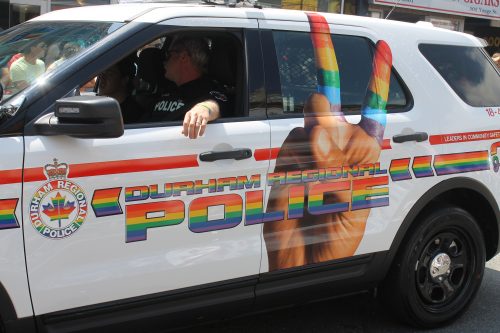This article was originally published on June 24 in the Toronto Star.

Pride Month is a celebratory fixture in many communities. Pride parades, flag raisings and community events are a testament to the progress LGBTQ people have made in terms of their acceptance by society.
But for some LGBTQ people, Pride Month can be a challenging time.
My research focuses on the workplace experiences of LGBTQ police officers who are at the centre of the debate on whether police should be allowed to participate in Pride parades. The growing movement to exclude police can disenfranchise LGBTQ officers from their own communities. Worse, it ignores and may compound their negative experiences in a traditionally heterosexual, male-dominated work environment.
LGBTQ police officers are a small minority within policing. In 2008, the Ontario Police College began collecting data on sexual orientation of recruits. Between 2008 and 2017, recruits self-identifying as “lesbian” averaged 1.4 per cent of the average class (110 total). Males identifying as “gay” have fared even worse, representing only 0.4 per cent of the average class (30 total).
In 2014, I interviewed 21 LGBTQ police officers about their workplace experiences. Their stories confirmed previous findings from American and British research that found that gay police officers sometimes led “dual lives” – where they divide their personal and professional lives – because of their hypermasculine workplace culture.
I also found these officers suffer from micro-aggressions in the workplace consisting of hostile, derogatory slights and insults. These factors can lead to LGBTQ officers developing a “blue identity,” which causes them to be “more cop” and less their “personal” selves while on the job.
LGBTQ cops reported being just as proud to be police officers as their peers and believe police culture has evolved to be more tolerant and accepting. But my research also found they still regard police culture to be stubbornly conservative and male dominated.
Most officers I interviewed for my study and my current research on female gay cops also believe that persistent “old school” attitudes with roots in the traditional police culture pose the greatest barriers for LGBTQ officers in areas such as training, promotions, mentoring and healthy workplace experiences.
The current divide between LGBTQ communities and their police services threatens to undermine the workplace experiences of gay cops.
Absent dialogue and a shared commitment to mutual understanding of past injustices committed by police against LGBTQ communities can stop new relationships based on trust from being formed. They can also hinder opportunities for LGBTQ officers to build on the generally greater acceptance of gay cops within police services.